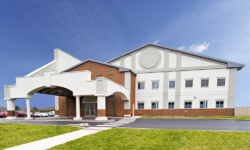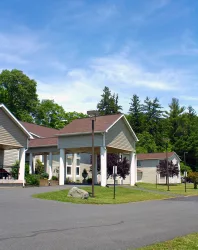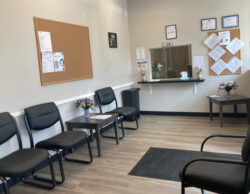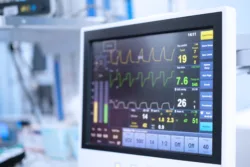Relapse Rates Are High, But The Right Treatment Program Can Help

Drug and alcohol addiction is a widespread issue that has caused suffering for individuals, families and communities across the United States, and northeast Pennsylvania is no exception. Understanding the relapse rates for drug and alcohol addiction in this region requires an approach that takes into consideration the socio-economic factors, availability of treatment resources and the types of substances most commonly abused.
And while relapse is discouraging, it is essential to remember that it is often a part of addiction recovery. For this reason, a well-formed aftercare program that considers relapse prevention is vital.
Are relapse rates for drug and alcohol addiction high?
Relapse rates for drug addiction are notoriously high nationwide, with some studies suggesting that 40-60 percent of individuals in recovery will experience a relapse at some point. In northeast Pennsylvania, these rates reflect broader national trends but are also shaped by unique regional characteristics.
According to the Pennsylvania Department of Drug and Alcohol Programs (DDAP), approximately 50 percent of individuals who complete treatment for substance use disorders in the state report relapse within the first year. While specific data for northeast Pennsylvania is limited, it is reasonable to infer that the region experiences similar relapse rates, if not slightly higher, due to various contributing factors.
Additionally, a study conducted by a prominent rehabilitation center in Scranton, PA, revealed that nearly 45% of their patients experienced a relapse for alcohol addiction within six months of completing their treatment programs. This figure is consistent with the broader trends observed across the United States but could vary depending on specific locations.
What causes high relapse rates?
One of the primary factors influencing relapse rates in northeast Pennsylvania is socioeconomic. Many areas within this region face economic challenges, including high unemployment rates, poverty and limited access to healthcare. These stressors can harm people, possibly worsening substance use disorders and hindering recovery efforts.
For instance, individuals who struggle to find stable employment or afford housing may turn to substance use as a coping mechanism, increasing the likelihood of relapse.
The availability and quality of treatment resources also play a crucial role in relapse rates. Northeast Pennsylvania has a mix of urban and rural areas, with rural communities often experiencing a shortage of healthcare providers and specialized addiction treatment facilities. This lack of access can impede long-term recovery, as individuals may be far removed from any treatment facilities that could help with long-term sobriety management.
Moreover, the stigma surrounding addiction in these tight-knit communities can discourage individuals from seeking help, further contributing to relapse rates.
What types of substances affect relapse?
The types of substances most commonly abused in northeast Pennsylvania play a unique role in relapse rates as well. The region has been significantly affected by the opioid epidemic, with fentanyl, heroin and prescription opioids as three of the most common offenders.
Opioid addiction is particularly challenging to treat due to the severe withdrawal symptoms and the high potential for dependence. Consequently, individuals recovering from opioid addiction may face a higher risk of relapse compared to those recovering from other substances.
What treatments best prevent relapse from happening?
Evidence-based treatments, such as medication-assisted treatment (MAT), cognitive-behavioral therapy (CBT) and support groups, have shown promise in reducing relapse rates. MAT, which combines medications like methadone, buprenorphine or naltrexone with counseling and behavioral therapies, has been particularly effective for opioid addiction.
However, access to MAT can be limited in rural parts of northeast Pennsylvania due to a shortage of certified providers and clinics. Expanding access to these evidence-based treatments is critical for improving long-term recovery outcomes. Pyramid Healthcare is proud to do just that, offering several locations in this region of Pennsylvania.
Another important aspect of managing relapse rates is ensuring comprehensive support systems that address all the needs of individuals in recovery—not only medical and psychological needs but also social support to help with employment, housing, and education.
Peer recovery support services, including Alcoholics Anonymous and Narcotics Anonymous, where individuals with lived experience of addiction provide guidance and encouragement, have also been shown to reduce relapse rates significantly. Northeast Pennsylvania has several initiatives incorporating peer support, and our resources at Pyramid Healthcare are here to help.
In need of help after relapse?
No matter if you have suffered from relapse or are trying to help a loved one battling the difficulties of relapse, Pyramid Healthcare is here to help. To contact a team member today, call 888-694-9996 or fill out our online contact form.
Drug and alcohol addiction is a widespread issue that has caused suffering for individuals, families and communities across the United States, and northeast Pennsylvania is no exception. Understanding the relapse rates for drug and alcohol addiction in this region requires an approach that takes into consideration the socio-economic factors, availability of treatment resources and the types of substances most commonly abused.
And while relapse is discouraging, it is essential to remember that it is often a part of addiction recovery. For this reason, a well-formed aftercare program that considers relapse prevention is vital.
Are relapse rates for drug and alcohol addiction high?
Relapse rates for drug addiction are notoriously high nationwide, with some studies suggesting that 40-60 percent of individuals in recovery will experience a relapse at some point. In northeast Pennsylvania, these rates reflect broader national trends but are also shaped by unique regional characteristics.
According to the Pennsylvania Department of Drug and Alcohol Programs (DDAP), approximately 50 percent of individuals who complete treatment for substance use disorders in the state report relapse within the first year. While specific data for northeast Pennsylvania is limited, it is reasonable to infer that the region experiences similar relapse rates, if not slightly higher, due to various contributing factors.
Additionally, a study conducted by a prominent rehabilitation center in Scranton, PA, revealed that nearly 45% of their patients experienced a relapse for alcohol addiction within six months of completing their treatment programs. This figure is consistent with the broader trends observed across the United States but could vary depending on specific locations.
What causes high relapse rates?
One of the primary factors influencing relapse rates in northeast Pennsylvania is socioeconomic. Many areas within this region face economic challenges, including high unemployment rates, poverty and limited access to healthcare. These stressors can harm people, possibly worsening substance use disorders and hindering recovery efforts.
For instance, individuals who struggle to find stable employment or afford housing may turn to substance use as a coping mechanism, increasing the likelihood of relapse.
The availability and quality of treatment resources also play a crucial role in relapse rates. Northeast Pennsylvania has a mix of urban and rural areas, with rural communities often experiencing a shortage of healthcare providers and specialized addiction treatment facilities. This lack of access can impede long-term recovery, as individuals may be far removed from any treatment facilities that could help with long-term sobriety management.
Moreover, the stigma surrounding addiction in these tight-knit communities can discourage individuals from seeking help, further contributing to relapse rates.
What types of substances affect relapse?
The types of substances most commonly abused in northeast Pennsylvania play a unique role in relapse rates as well. The region has been significantly affected by the opioid epidemic, with fentanyl, heroin and prescription opioids as three of the most common offenders.
Opioid addiction is particularly challenging to treat due to the severe withdrawal symptoms and the high potential for dependence. Consequently, individuals recovering from opioid addiction may face a higher risk of relapse compared to those recovering from other substances.
What treatments best prevent relapse from happening?
Evidence-based treatments, such as medication-assisted treatment (MAT), cognitive-behavioral therapy (CBT) and support groups, have shown promise in reducing relapse rates. MAT, which combines medications like methadone, buprenorphine or naltrexone with counseling and behavioral therapies, has been particularly effective for opioid addiction.
However, access to MAT can be limited in rural parts of northeast Pennsylvania due to a shortage of certified providers and clinics. Expanding access to these evidence-based treatments is critical for improving long-term recovery outcomes. Pyramid Healthcare is proud to do just that, offering several locations in this region of Pennsylvania.
Another important aspect of managing relapse rates is ensuring comprehensive support systems that address all the needs of individuals in recovery—not only medical and psychological needs but also social support to help with employment, housing, and education.
Peer recovery support services, including Alcoholics Anonymous and Narcotics Anonymous, where individuals with lived experience of addiction provide guidance and encouragement, have also been shown to reduce relapse rates significantly. Northeast Pennsylvania has several initiatives incorporating peer support, and our resources at Pyramid Healthcare are here to help.
In need of help after relapse?
No matter if you have suffered from relapse or are trying to help a loved one battling the difficulties of relapse, Pyramid Healthcare is here to help. To contact a team member today, call 888-694-9996 or fill out our online contact form.










